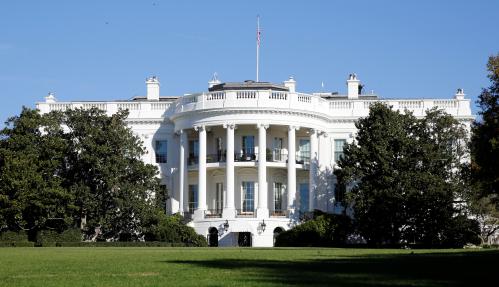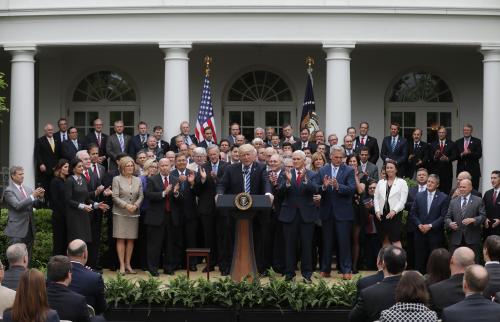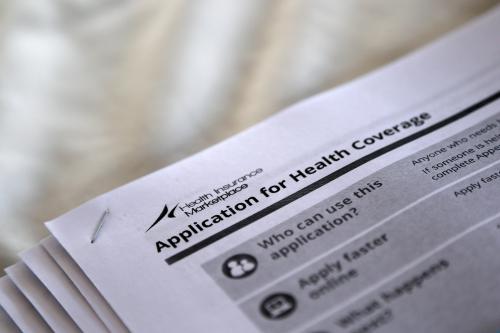With the failure of the American Health Care Act (AHCA), congressional Republicans and President Trump are left without an obvious legislative route to revising the Affordable Care Act (ACA). In this climate, the Trump administration may pursue alternative options to achieve health care reform, including soliciting and approving state waivers from the law.
Secretary of Health and Human Services Tom Price recently issued a letter to the nation’s governors outlining the administration’s approach to Section 1332 waivers.[1] Section 1332 of the Affordable Care Act authorizes the Secretaries of HHS and the Treasury to jointly approve waivers of certain ACA provisions to allow for “state innovation” to take effect on or after January 1, 2017. Under this waiver authority, states would not be subject to one or more parts of the ACA, but only if they provide a plan for alternative, state-level policies that would cover “as many state residents as would be covered absent the waiver.” The coverage provided under states’ substitute plans must also be as comprehensive and affordable as it would be without the waiver, and their implementation cannot increase the federal deficit. We reflect on how the administration might hope to use these waivers moving forward and, importantly, how states may respond to this strategy.
As we have written before, it is not unusual for states to ask the federal government to waive provisions of federal law to allow states to implement innovative programs that they could not create within existing law. For example, under Democratic and Republican presidents, the federal government has granted states flexibility to make changes to their Medicaid and welfare programs using Section 1115 to K-12 education using waivers from the Elementary and Secondary Education Act. States are not, however, the only ones with something to gain from the waiver process. Waivers offer presidents a valuable opportunity to pursue their policy goals without relying on congressional approval. Particularly when gridlock in Congress threatens to prevent policy change, approving state waiver applications offers presidents an opportunity to claim credit for policy reform. The “flexibility” rhetoric we often hear from presidents on waivers, moreover, is a two-way street. Yes, granting waivers does indeed involve authorizing state flexibility from federal law, but the administration enjoys broad discretion of its own over deciding what kind of policy changes to authorize under waivers and which waivers to approve.
In this context, the January 2017 start date for Section 1332 waivers is particularly fortuitous for the Trump administration. Legislative gridlock is often associated with divided government (though, as our colleague Sarah Binder has shown, polarization may matter more for predicting stalemate in recent years). Indeed, one of us has documented the increased use of waivers by presidents when he is ideologically far from Congress, contingent on the share of the nation’s governors in his party. Although the Republicans currently enjoy unified government, intraparty divisions among congressional Republicans have arguably produced a similar environment as under divided government, at least when it comes to repealing and/or replacing the ACA. GOP members struggled to come to agreement on what their health care legislation should include, and while we may eventually see legislative action, a major revival of the effort seems unlikely in the near term.
Approving Section 1332 waivers, however, could offer the Trump administration an easier outlet for making changes to the ACA. Indeed, Secretary Price frames the administration’s approach to Section 1332 waivers as a key part of its strategy to address the problems it associates with the ACA. This waiver process, then, may be an opportunity for Republicans to claim credit for reforming health care, even if that change does not ultimately come through the legislative process. Both branches emphasized this possibility even during debate over the AHCA, highlighting the fact that administrative actions would represent “bucket two” of an ideal three-bucket health reform strategy.
The Trump administration would not be the first to pursue such a strategy. During his efforts to secure major legislative reforms to welfare and healthcare, President Bill Clinton approved many welfare and Medicaid waivers, which are both authorized under Section 1115 of the Social Security Act Amendments of 1962 and frequently claimed credit for facilitating state-level reform in the face of congressional obstructionism. Consider Clinton’s January 1995 comment on the matter: “I sent welfare reform legislation to the Congress last year, and when they didn’t pass it, we just kept on giving States permission to get around the Federal rules to move people from welfare to work and to support responsible parenting, 24 States, more than were given waivers from the Federal rules in the previous 12 years combined.” With the Republicans’ decision to pull the AHCA from the floor and Speaker Ryan’s statement that “we’re going to be living with Obamacare for the foreseeable future,” President Trump may pursue a similar tactic.
While Section 1332 waivers may be an attractive way to accomplish policy change without Congress’s cooperation, the particular requirements that states must meet impose important substantive and procedural constraints on their access to flexibility. In addition to the requirements involving coverage, affordability, comprehensiveness, and deficit neutrality discussed above, a state’s ability to obtain a waiver is contingent on actually applying for one. The Trump administration can only approve dramatic changes to the law to the extent that states submit applications that propose such changes within the legal parameters of the process. Whether states choose to pursue these changes will shape whether the administration can successfully shift policy in this direction.
In many cases, the changes that Republican governors pursue through waivers may be consistent with the policy changes advocated by their peers at the national level. Given Trump’s historically low approval ratings and congressional Republicans’ bruised reputations following the AHCA failure, however, national Republicans may find themselves with little political capital to use in pressuring states into implementing waiver plans reflecting federal preferences if states want to go a different direction.
At the same time, two key procedural elements of Section 1332 waivers may limit the state-level changes enacted via waivers. First, as with Medicaid waivers under Section 1115, states must allow for a public notice and comment period on their waiver application before they are eligible to submit the application to the federal government. Under a final rule on Section 1332 waivers published in February 2012, states must also provide to HHS a “description of the key issues raised” during the comment period. While this mandatory public record may seem innocuous enough, it could provide citizens and interest groups at the state level with valuable ammunition to oppose waiver applications.
Second, and in contrast to the waiver process under Section 1115 and other waiver provisions, the ACA requires states to enact a new law providing for implementation of the section 1332 waiver. While states’ internal political dynamics can affect the waiver application process in a number of ways, this requirement formalizes a role for those forces in the process. Some states have already begun to pursue legislation to authorize Section 1332 waivers; the National Council on State Legislatures reports that during the 2015-16 state legislative sessions, 17 states considered legislation to enact Section 1332 waivers, with 10 of these states successfully passing them. With Republican governors in control of 33 states, 24 of which have Republican legislatures as well, this hurdle might not end up delaying many Section 1332 applications. In states where different parties control the governorship and the legislature, however, this procedural barrier could limit the potential for states to request flexibility from the ACA via this waiver process.
If states are able to formulate proposals and pass the legislation necessary to implement them if approved by the Secretaries of HHS and Treasury, Section 1332 waivers may help them address one of the challenges governors face in the current health care debate: the political interests of Republicans at the state level are not necessarily the same as those of their federal colleagues. The debate over how to handle Medicaid in the AHCA was perhaps the best example of this dynamic, but governors like John Kasich (R-Ohio) have also expressed concerns about, for example, the bill’s tax credits. Given that waivers may also serve as an important source of credit claiming for Republicans currently struggling to adopt change legislatively, we’ll be closely watching how this process unfolds in the months to come.
[1] Separately, the administration also released a letter detailing its priorities for Section 1115 waivers.











Commentary
In wake of AHCA failure, will Trump turn to states to revise ACA?
March 28, 2017